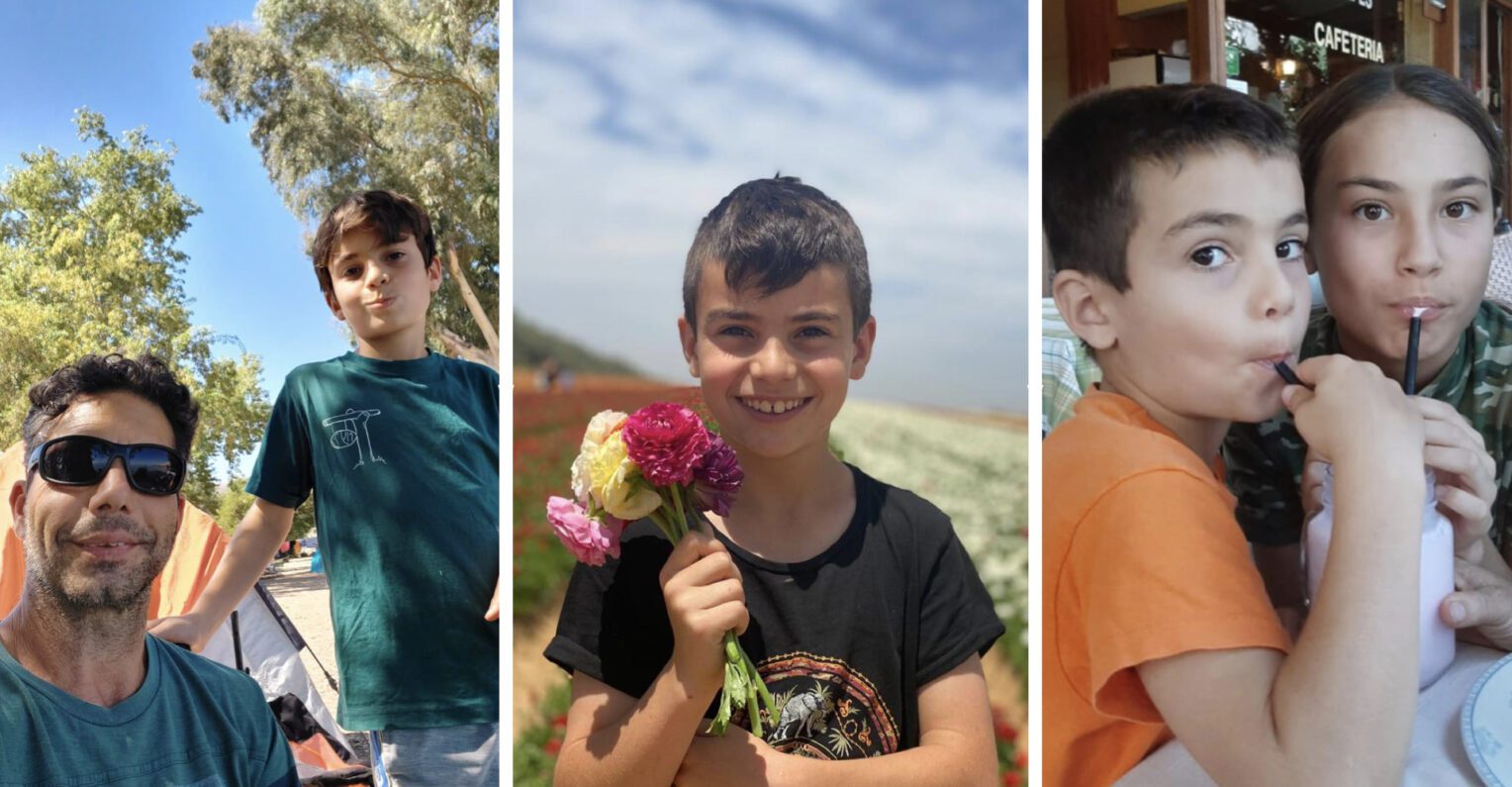Imagine that your 12-year-old son or brother was taken from you by the same people who just burned and massacred your closest friends and neighbors. Picture him trapped in an unknown cage, his fear palpable. Envision his cherubic face haunting you at night, tormenting you hour after hour. Imagine the agony of not knowing anything about his fate. Is he alive or dead? Is he being tortured? Is he being fed? Visualize the feeling of helplessness and the nightmares that gnaw at your very soul. You can’t eat, drink, or sleep for days; and if you do, you’re hardly aware of it. Even breathing seems impossible. Imagine enduring this day after day after day. 13 and counting.
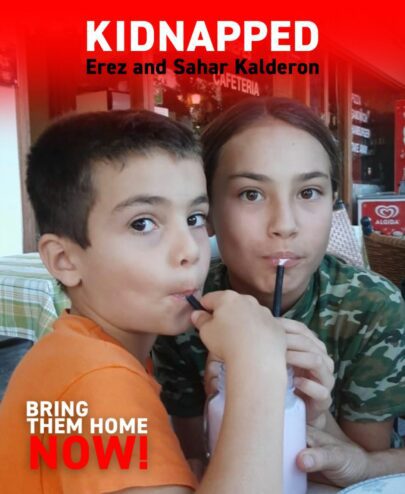
Gaya Kalderon, 21, doesn’t need to imagine hell; she lives it. Minute by agonizing minute since the horror that unfolded on that fateful October 7th morning, her family has been thrust into the abyss of Gaza, violently taken by Hamas kidnappers. Gone are her father, Ofer; her 16-year-old sister, Sahar; her 12-year-old brother, Erez; her 13-year-old cousin, Noya; and her 80-year-old grandmother, Carmela.
“You ask me how I endure this hell, and my answer is simple: I have no idea,” she says. “In some ways, it’s impossible to call it ‘living.’ How can one live without breathing? How can you comprehend that half of your closest family has been transported to another world? And how do you maintain your sanity when just the thought of what my cute, hyperactive, nature-loving brother is enduring in that abyss could drive you to madness? So, I do everything in my power not to dwell on it. I keep talking, keep begging, keep calling everyone and pleading: Please, please, do everything you can to bring them back to me. To us.”
They were a tight-knit family residing in Nir Oz, a kibbutz that resembled a small paradise with its lush lawns and charming houses, children’s bicycles scattered about. Riding bikes had become a cherished family activity since Ofer, at the age of 53, developed a passion for it years ago. He was part of a cycling club called ‘Dardasim’, whose members convened for rides nearly every weekend from various corners of Israel and embarked on special week-long rides in Europe at least twice a year. “He was the one who always brought a smile and laughter,” reminisced his teammate, Nir Etzion.
Ofer passed on this passion to his youngest son, Erez. Gaya fondly recalls the hours they spent together, father and son, riding side by side. They were a close-knit bunch. Ofer, a skilled carpenter, had passed down his artistic talents to his daughter, Sahar, who played the guitar, sculpted, and drew. Gaya remembers how she and her sister would often venture into the surrounding nature to while their time drawing together.
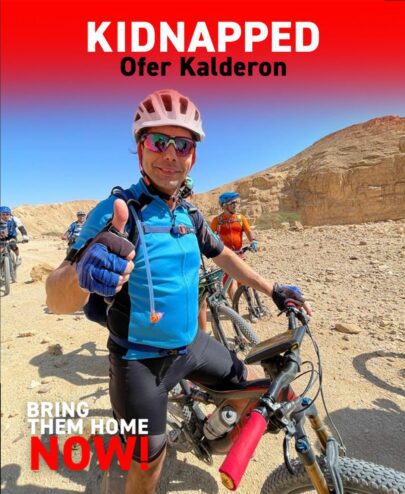
Yet, life in recent years was far from picture-perfect. The small kibbutz and the surrounding areas were constantly targeted by rockets launched from Gaza, leaving profound scars on the Kalderon family’s children. Erez suffered from severe anxiety, as did his cousin Noya. Li Dan, a close relative, recounted that the first thing Erez would do when visiting her was to locate the home’s shelter in case of a rocket attack. The mere thought of her kidnapped relative in the clutches of the terrorists who have taken him into the depths of captivity brought her immense misery. “Can you imagine him living his worst nightmares? I fear he believes he’s been left alone in this world, with everyone who was part of his life either dead or as helpless as him. He thinks: Nobody will ever save me. Every day he’s there, every minute is an endless trauma. That’s why we must do everything to bring him and the others back as soon. Now, not later. First priority – before everything else.”
Around 07:00 on that fateful Saturday, the family’s WhatsApp group was inundated with a relentless stream of messages, unveiling the horrifying events almost minute by minute. “The terrorists are here killing people,” wrote their mother, Hadas Kalderon, at 08:22. “It’s sheer horror… I love you all, but it might be our farewell. What’s happening here is a Shoah.” The term Shoah, Hebrew for Holocaust, is not one used lightly, but Hadas was describing what the world would soon discover over the next 24 hours: that this day was indeed the darkest in Jewish history since the end of the Holocaust in 1945. By that very evening, 1300 lives had been lost, including more than 70 from the Kalderon’s small kibbutz alone.
Hadas had to endure it all from her small shelter, clutching the door handle desperately to keep the terrorists from entering while they shouted “Allahu Akbar” (God is great) and vowed to kill her. Yet, as a mother, her primary concern was her two children, Erez and Sahar, who were hiding with their father, Ofer, in another house. At some point, a message came from young Erez: “We’re hiding in the bushes.” It seemed that Ofer realized he couldn’t protect his children if he remained at home, so they all fled through one of the windows. However, their efforts were in vain. Hours later, a video surfaced, shot by Hamas, documenting Erez being dragged away. At 19:14 that evening, the horrifying news reached Hadas, the mother. “My children, Ofer, and my mother, are not responding. They are either kidnapped or murdered. They’ve burned all the houses to the ground. They’ve killed. They’ve looted. Shoaaaaaah. Pray.”
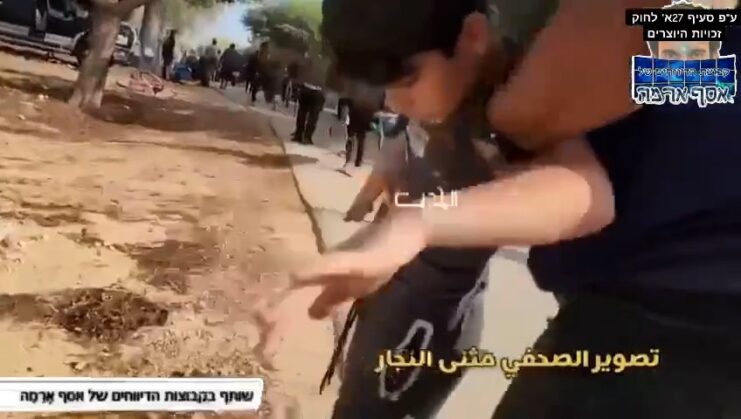
The charred remains of houses are all that’s left of most of Kibbutz Nir Oz. What remains hidden are the staggering numbers—over 100 dead and missing—and the overwhelming emotions: helplessness, anger, despair, anxiety, but also unwavering determination, engulfing the families. There are now at least 199 of them, and the numbers are far from final. With tremendous help from volunteers from all walks of life, the families have united under the banner of the “Hostages and Missing Families Forum”. This organization coordinates efforts to free the hostages by rallying support from around the world. They’re determined to make this a top priority for not only the Israeli government but also numerous other countries (among the hostages are many foreign citizens) and organizations such as the Red Cross.
They’re appealing to every human heart to raise awareness. In the coming days, they’ll release wristbands similar to those carried by participants of the Nova Music Festival—where hundreds of young people were murdered. The wristband will read, “As long as they are there,” and it will serve as a reminder that “We are there.”
Gaya Kalderon and all the family members left behind are tirelessly leading the fight to free their loved ones. They have built a virtual command post of friends and family, where every piece of information is collected and where they receive (constantly) calls of support. The Dardasim, Ofer’s cycling club, is also acting as a support group right now, but tragically, Ofer is not the only missing member. Oren Goldin, a father of two from Nir Itzhak, has also been missing since Oct 7, when he was last seen trying to protect his kibbutz from the Hamas terrorist’s invasion.
“I want everyone to hear about my family members who are being held hostage and do something. Anything. Hope is what keeps me going. I must believe that they will be returned; otherwise, I will be lost.” The unknown makes it all the more challenging. The only real evidence they possess is the video documenting Erez’s kidnapping, and they are desperately clinging to the hope that Ofer survived the slaughter and is being held hostage by Hamas. “We pray that Ofer is with his children,” says Li, a close relative of the family. “He is an amazing dad, and he will do everything to shield them from the trauma.”
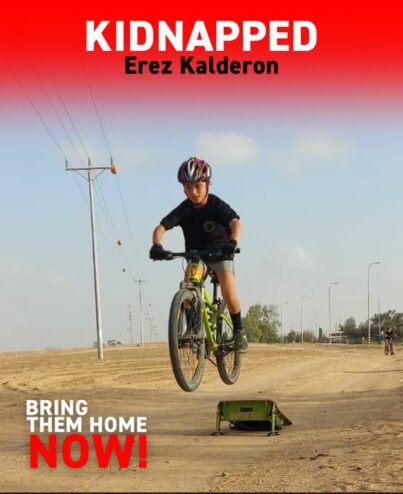
Two days ago, they received devastating news: two bodies had been discovered and identified as Carmela and Noya. The remaining family buried their loved ones this morning in one of the endless funerals taking place all over the county. Sharon, the kidnapped children’s aunt, came from Eilat where she had been evacuated to. She confessed she had skipped more than 30 funerals of friends who had perished in the massacre as a way to keep her sanity intact. “We are all in survival mode,” she says.
Sharon, too, found herself in her kibbutz that harrowing morning, taking refuge in the shelter while hearing the chilling cries: “We are coming in to kill you.” At that moment, she began penning her farewell to her children. Although she survived the ordeal, she has no time to recover from or battle her personal trauma when Ofer, Sahar, and Erez are still in the abyss. “We have no time to lose. It must be the top priority.”
In just a few days, on October 26th, Erez will celebrate his 12th birthday. The Kalderon family fervently prays and hopes to see him mark this occasion at home. Is it realistic? They aren’t contemplating the odds; they’re fighting as though there’s no tomorrow, understanding that every minute is precious, with no time to squander.
But they are not alone. The whole country is engrossed with the ordeal of the hostages – thirty of whom are children. “We all feel their pain and mission so deeply,” says Guy Sagiv, one of Israel – Premier Tech’s Israeli riders. His wife, professional cyclist Omer Shapira, was born in that area of the western Negev near Gaza and knows many of the families who are enduring this trauma. Three of her former classmates are among the kidnapped. “As a young mother,” she says, “I just cannot comprehend the magnitude of the nightmare they are facing. We are all behind them in the quest to bring them home now.”
#BringThemHomeNow

